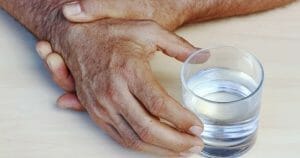Migraine is comorbid with Parkinson’s Disease, a central nervous system disorder that affects movement. It is a progressive disease, where symptoms generally begin slowly and worsen over time. Parkinson’s causes a gradual loss of the nerve cells in the brain that produce the neurotransmitter dopamine.[1] The reduction in dopamine causes unintended or uncontrollable movements, such as shaking, stiffness, and difficulty with balance and coordination.
It is estimated that about 6 million people worldwide suffer from Parkinson’s—and it is second only to Alzheimer’s disease as the most prevalent neurodegenerative disease.[2] While anyone can get Parkinson’s, men are more at risk than women.[3] The risk for developing the disease increases with age and genetics likely play a role.
The Migraine-Parkinson’s Relationship
According to one study, 27.8% of Parkinson’s patients had migraine within their lifetime and 13.1% of patients currently had migraine.[4] Interestingly, after the onset of Parkinson’s disease, almost two thirds of Parkinson’s patients had improvement in their migraine attacks or complete remission.[5]
It is also believed that migraine with aura increases the risk for Parkinson’s,[6] and we know that both migraine and Parkinson’s can be linked to traumatic brain injuries, which may also be reason for the connection to each other.[7] To add to the complexity, migraine and Parkinson’s are both comorbid with other overlapping conditions such as sleep disorders, depression and cardiovascular disease.
Parkinson’s Symptoms
The main symptoms of Parkinson’s disease include:[8]
- Tremor in hands, arms, legs, jaw, or head
- Muscle stiffness
- Slowness of movement
- Impaired balance and coordination
Other symptoms may include:
- Depression and other emotional changes
- Difficulty swallowing, chewing, and speaking
- Urinary problems
- Constipation
- Skin problems
Some people may also experience changes in their cognitive focus, and may have trouble concentrating, remembering things or being able to accomplish daily tasks.
Parkinson’s Treatment
Like migraine, there is no cure for Parkinson’s disease, but there are some medications, surgical treatments and other therapies that can often relieve some symptoms.[9] These include:
- Dopamine-increasing medications
- Enzyme-inhibitors
- Anticholinergic drugs
- Deep brain stimulation
- Physical and occupational therapy
- Massage therapy
- Regular, gentle exercise
Parkinson’s disease progresses slowly, but over time it can have a very challenging impact on a person’s quality of life. Because Parkinson’s shares symptoms with other diseases such as Dementia with Lewy Bodies, Progressive Supranuclear Palsy and others, it can be difficult to obtain an accurate diagnosis. Be sure to talk to your doctor if you live with migraine but also start to experience symptoms such as slowness, stiffness and/or resting tremors.
Let Us Know!
Tell us! Do you live with migraine and Parkinson’s disease? Did you experience a reduction in migraine attacks after developing Parkinson’s, or does Parkinson’s make your attacks more severe?
Sources
[1] https://parkinsonfoundation.org/about-parkinsons-disease?gclid=Cj0KCQiAutyfBhCMARIsAMgcRJSCc-tK1jSohLKCFK_2G_M7zUK-Ka58ES9H3r7VwnrEiqliYjqDalsaAv9XEALw_wcB
[2] https://parkinsonfoundation.org/about-parkinsons-disease?gclid=Cj0KCQiAutyfBhCMARIsAMgcRJSCc-tK1jSohLKCFK_2G_M7zUK-Ka58ES9H3r7VwnrEiqliYjqDalsaAv9XEALw_wcB
[3] https://www.nia.nih.gov/health/parkinsons-disease
[4] https://www.migrainedisorders.org/migraine-and-parkinsons-disease/
[5] https://www.migrainedisorders.org/migraine-and-parkinsons-disease/
[6] https://www.medicalnewstoday.com/articles/282678#Tracing-Parkinsons
[7] https://www.ncbi.nlm.nih.gov/pmc/articles/PMC4180488/
[8] https://www.nia.nih.gov/health/parkinsons-disease
[9] https://www.nia.nih.gov/health/parkinsons-disease